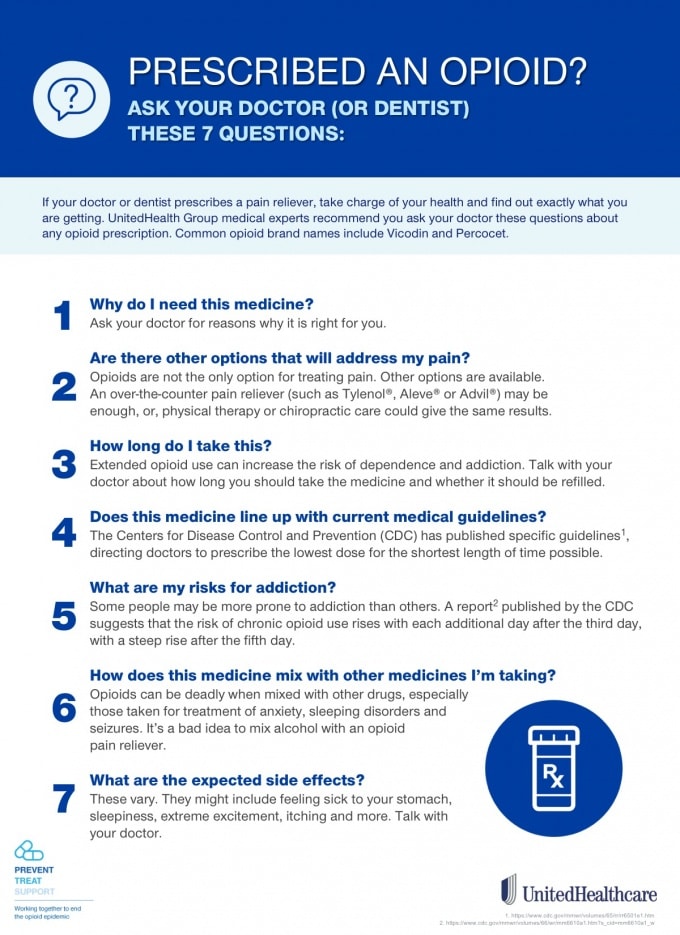With the opioid crisis in full swing here in America, it can be downright frightening to accept a prescription for opioids. I've partnered with UnitedHealthcare to share some questions you should ask your healthcare provider in the event you're prescribed an opioid.
I've had two surgeries in my lifetime and both times I was prescribed opioids to manage my post-operative pain. My first surgery was at age 19. I did well managing the pain and only took one painkiller before deciding I didn't like the way it made me feel. The second surgery was a tonsillectomy. I was 24 years old and the pain was unbelievable. I had no idea having my tonsils removed would cause such exquisite pain. I tried to go without any opioids, but eventually, I had to give in and take them around the clock. Thankfully, I was able to wean off of them within a week. I will admit though, I was nervous. I don't have an addictive personality, but I knew other people who struggled with addiction and I did not want to become one of them.
So, what should you do if you're prescribed an opioid? I've got some sage advice for you below.
What's an opioid?
First things first, if you're not familiar with opioids then let me break it down for you. Opioids, commonly known as painkillers, are a group of medications that are used to relieve minor to severe pain. They are usually reserved for moderate to severe pain. Opioids include opiates, including morphine, and synthetic drugs such as hydrocodone, oxycodone, and fentanyl, among others.
These medications are known to become misused and abused. In fact, opioid abuse and overdose have become an epidemic in this country. That's why you need to be an advocate for yourself when it comes to the prescribing of these types of medications.
What to do if you're prescribed an opioid.
If you're in pain or you've had a procedure done by your dentist or doctor, you may be prescribed an opioid pain reliever. This is precisely the time to ask some questions.
Dr. Sam Ho, the chief medical officer of UnitedHealthcare put together a list of questions you should ask your healthcare provider before taking any painkillers like Vicodin, Percocet, Roxicet, or others.
Why do I need this medicine?
Ask your doctor for reasons why it is right for you.
Are there other options that will address my pain?
Opioids are not the only option for treating pain. Other options are available. An over-the-counter pain reliever (such as Tylenol®, Aleve® or Advil®) may be enough, or, physical therapy or chiropractic care could give the same results.
How long do I take this?
Extended opioid use can increase the risk of dependence and addiction. Talk with your doctor about a how long you should take the medicine and whether it should be refilled.
Does this medicine line up with current medical guidelines?
The Centers for Disease Control and Prevention (CDC) has published specific guidelines, directing doctors to prescribe the lowest dose for the shortest length of time possible.
What are my risks for addiction?
Some people may be more prone to addiction than others. A report published by the CDC suggests that the risk of chronic opioid use rises with each additional day after the third day, with a steep rise after the fifth day.
How does this medicine mix with other medicines I’m taking?
Opioids can be deadly when mixed with other drugs, especially those taken for treatment of anxiety, sleep disorders, and seizures. It’s a bad idea to mix alcohol with an opioid pain reliever or muscle relaxants.
What are the expected side effects?
These vary. They might include feeling sick to your stomach, sleepiness, extreme excitement, itching and more. Talk with your doctor.




Leave a Reply